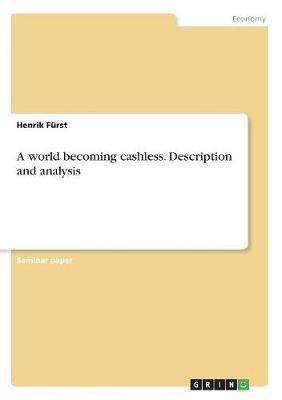
A world becoming cashless. Description and analysis
Seiten
2017
|
17001 A. 1. Auflage
GRIN Verlag
978-3-668-39787-3 (ISBN)
GRIN Verlag
978-3-668-39787-3 (ISBN)
- Titel nicht im Sortiment
- Artikel merken
Seminar paper from the year 2014 in the subject Economics - Finance, grade: 10,0, University of Southern Denmark, language: English, abstract: The history of the evolution of money also shows how the human beings developed itself on a mental way. Starting with a so called "Barter economy" where for example animals like cows and sheep where used as kind of "currency" or rather "exchange product", years later going over to using shells as currency and finally ended up with money as we know it today,
as paper- and metal-money.
As mentioned, bartering where a common way of "paying", which basically means, that to receive some goods, you had to give some other goods. To avoid disagreements of the value of different goods, commodity money was invented. Commodity money were daily goods, like salt. That some commodity goods brought problems like the size or defensibility, was found out later. The Lydian's were the first folk, who invented coins. Decades later the Chinese were the first ones, who invented paper money. This invention of coins, named commodity money, quick became a worldwide used item. From now on, a "customers" needs could easier be fulfilled, since there was something that had a certain value.
By inventing the first representative money, the society especially in Europe where allowed to enter a totally new era. Banks created the first so-called currency market, international trade activities where possible and the value of a countries currency depended on its political behavior. During the 17th century, commodity money slowly got replaced by representative money, since global bank and trade networks were steadily increased.
Representative money is in form of paper bills or guarantees of the bank. Later the value of money for the first time was tied up to gold, the gold standard. Since the economy kept on growing, representative money got replaced by fiat money. Enforceable legal tender laws have been made, which basically means that the money's value is given by the governments decree and fiat. Free capital was invented. The growth of economic sectors was significantly fostered by this invention, but also the chance to make debts.
as paper- and metal-money.
As mentioned, bartering where a common way of "paying", which basically means, that to receive some goods, you had to give some other goods. To avoid disagreements of the value of different goods, commodity money was invented. Commodity money were daily goods, like salt. That some commodity goods brought problems like the size or defensibility, was found out later. The Lydian's were the first folk, who invented coins. Decades later the Chinese were the first ones, who invented paper money. This invention of coins, named commodity money, quick became a worldwide used item. From now on, a "customers" needs could easier be fulfilled, since there was something that had a certain value.
By inventing the first representative money, the society especially in Europe where allowed to enter a totally new era. Banks created the first so-called currency market, international trade activities where possible and the value of a countries currency depended on its political behavior. During the 17th century, commodity money slowly got replaced by representative money, since global bank and trade networks were steadily increased.
Representative money is in form of paper bills or guarantees of the bank. Later the value of money for the first time was tied up to gold, the gold standard. Since the economy kept on growing, representative money got replaced by fiat money. Enforceable legal tender laws have been made, which basically means that the money's value is given by the governments decree and fiat. Free capital was invented. The growth of economic sectors was significantly fostered by this invention, but also the chance to make debts.
| Erscheinungsdatum | 25.03.2017 |
|---|---|
| Sprache | englisch |
| Maße | 148 x 210 mm |
| Gewicht | 49 g |
| Themenwelt | Sachbuch/Ratgeber ► Beruf / Finanzen / Recht / Wirtschaft ► Familienrecht |
| Wirtschaft ► Volkswirtschaftslehre | |
| Schlagworte | Cash • Cashless • Corprate Finance • CorprateFinance • Finance • Volkswirtschaft • Volkswirtschaftslehre |
| ISBN-10 | 3-668-39787-2 / 3668397872 |
| ISBN-13 | 978-3-668-39787-3 / 9783668397873 |
| Zustand | Neuware |
| Haben Sie eine Frage zum Produkt? |
Mehr entdecken
aus dem Bereich
aus dem Bereich
Antrag auf Pflegegrad, Pflegeprotokoll, Pflegezeit, …
Buch | Softcover (2024)
Stiftung Warentest (Verlag)
16,90 €
Buch | Softcover (2024)
Komplett-Media (Verlag)
24,00 €


